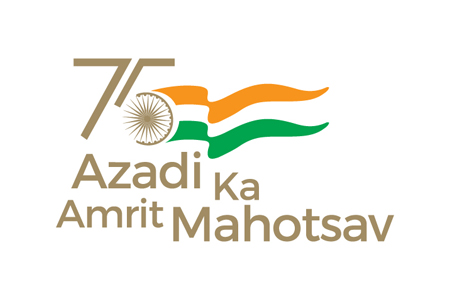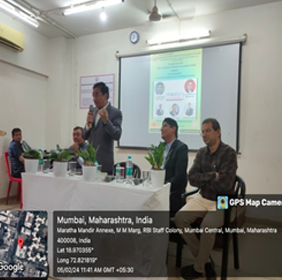The Budget for the fiscal year 2024, declared on February 1, 2024, indeed reflects a comprehensive approach to fiscal management, taxation, and economic growth—a sentiment echoed by our esteemed Chartered Accountants. The Finance Department along with other Faculty members and the staff of Maratha Mandir’s Babasaheb Gawde Institute of Management Studies in association with WIRC of the Institute of Chartered Accountants of India organised a Panel Discussion “Unlocking Insights: Expert Panellist’s Reframe the Union Budget Discussion” on Monday 5th February 2024, from 10:30 am to 12:30 pm. A total of 73 Students from MMS Semester II (58 students) and MMS Semester IV (15 students) attended the session. The session was livestreamed on Facebook and viewed by around 300 people.
Our panel of experts were:
The energetic CA Santosh Ghag served as the acting moderator, guiding the discussion seamlessly. CA Mandar Telang, an expert in GST (IDT), shared his in-depth knowledge of the intricacies of indirect taxation. CA Shardul Shah, a Direct tax expert, provided valuable insights into the direct tax implications of the budget. Lastly, we were honoured to have CA Nimesh Kampani, an upcoming shark tank panellist and investment expert, who shed light on the potential impact of the budget on investment strategies.
The key topics touched upon were:
- Litigation and FEMA:
The budget addressed litigation concerns with faceless international transactions and incorporated the Directorate of Revenue Intelligence (DRI) into the faceless assessment process. It also emphasized FEMA regulations for transparent financial transactions.
- Taxation:
Noteworthy avenues include Tax Collected at Source (TCS) and Tax Deducted at Source (TDS). TCS applies to foreign remittances exceeding 7 lakhs, excluding medical and educational transactions. GIFT City, was introduced as a tax-free zone for international transactions not in Indian rupees.
- Income Tax Assessment:
The threshold for tax assessment was set at 7 lakhs, with no tax on income below this mark. Faceless assessment and measures against undisclosed income aim to enhance tax compliance.
- Indirect Tax Contribution:
GST, constituting 42-45% of total taxes, is crucial. Monthly assessments and taxation based on gross income ensured a larger tax base.
- Fiscal Management:
The fiscal deficit was projected to decrease from 5.9% to 5.1%, with a targeted fiscal deficit of 3%. Responsible financial management was evident in the declining revenue deficit and prudent fiscal policies.
- Investment Strategies:
The budget highlighted potential growth sectors for the next five years, allocating a significant Capex of 11.11 lakh crore. Recommendations included long-term (10-year) investments in various NIFTY 50 stocks.
- Financial Planning and Inflation:
The report recommended a cautious investment approach, emphasizing the significance of bull and bear market cycles. Long-term investments, particularly in blue-chip stocks and mutual funds through SIPs, were recommended for mature investors.
The students appreciated the event. The question-answer session lasted for almost 40 minutes. The convergence of these distinguished professionals and our academic community made for a truly insightful and enriching discussion. Together, we aim to foster a deeper understanding of the fiscal landscape and its implications for our community and beyond.
*Note: Hint towards the start of amritkal with the power of seven (7 inflation, 7 Interest rates, 7 Tax exemptions) given by the CA’s in action. For more details, visit our Facebook page where we went live to catch the action.


